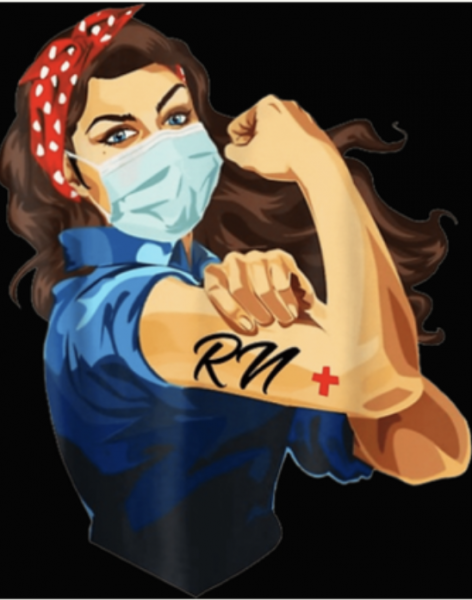
A Columbus-based Registered Nurse shares their observations from the frontlines in the fight against COVID-19. Due to the sensitive nature of their job—and to speak without the filter of administrators and attorneys—this established local RN was granted anonymity for our interview.
What have you personally encountered while working at the hospital during the pandemic?
“In my six years as a nurse, I have never seen the number of patients as sick as they are
Normally, you go into work, and in a typical unit, you have maybe 3 out of 23 patients who are really sick. You keep them on your radar because they have the capability to go one way or another, as far as their stability. But when I came into work a week ago, there were 23 patients on the floor, and 9 of those were on what we call a BiPAP.
BiPAP is the basically last step before somebody is intubated and put on a ventilator. It’s a large mask that covers the nose and the mouth that hooks up to an oxygen machine. You can control the amount of oxygen going in and out; you can turn it up to 100% oxygen.
In a normal year, we don’t use those on patients very often, but so far in 2020, we’ve been using them a lot. We’ve been using those because, once you put a patient with COVID-19 on a ventilator, they have a very low survival rate coming off that ventilator. We’re doing everything we can to keep them off of one and make that the last resort.”
Are there any open beds available at the hospital right now?
“We’ve been at what’s called saturation for at least the last month. We really don’t have any beds. Our ICU beds have been completely full. We have to keep patients in the emergency room rooms because our hospital beds upstairs have been completely full.”
One thing you hear about with COVID is the huge variety of symptoms you see in people. What are some of the health issues that you have seen on patients?
“The ones you see coming into the hospital are acute cases. Mostly those are requiring oxygen because they weren’t able to maintain their oxygen levels at home. So shortness of breath is one of the main things people are being admitted for.
And, of course, fatigue. Some patients tell us they lost their sense of taste. Diarrhea. Abdominal pain. Just such a wide variety of symptoms that we’ve been seeing. The main thing we focus on, and the main thing we’ve seen with the sickest patients, is their airway comprised. Their shortness of breath and needing large amounts of oxygen.”
Are you and your co-workers feeling stressed, feeling overworked?
“We’ve been fortunate in that a lot of state nurses have been coming in the last two weeks. Since those state nurses came in, things have gotten a lot better. We were stressed and we were overworked. We had a couple of empty beds that could not fill because we did not have the staff to take care of those patients.
I would say it’s getting better. It is still stressful. It is still overwhelming at times. When those patients aren’t able to have their families there, you’re the support for that patient. Not only are you medically taking care of them, you’re emotionally supporting them. And many times these patients aren’t able to communicate, depending on how sick they are. So it is a little overwhelming at times. But rewarding as well.”
What worries you the most about this virus?
“I just worry about this spike that we’re having right now. I worry that it’s going to get worse. Because right now, we’re having to hold ICU patients in the ER because there are no beds in ICU.
So my concern is what do we do when there are no more beds. When there is no more room in the ER. I worry about a bigger influx of sick people in our community coming in.”
Is there any way to determine where we currently stand as far as the lifecycle of this virus?
“It’s so hard to say because we have seen such an increase in numbers. It’s hard to say if we’re at a plateau, or if there’s a chance that it could continue to go up. It’s just hard to say.”
Is the data about the virus that is made available to the public accurate?
“You see so many things in the media about it being falsely reported. Some saying it’s accurate. I try not to watch a lot of the media. I try not to focus on what’s being reported, per se. I try to focus on the here and now and what I see in the hospital.”
What precautions are you taking on the job to avoid contracting COVID?
“We’re given scrubs that we use. We come into work in our normal clothes, change into new scrubs we get out of this machine. When we’re done with work, we change out of those and put them back into the machine and they’re handled by laundry.
When we’re on a regular unit, we wear a surgical mask. When we go into these patients’ rooms, we’re wearing a disposable gown, a N-95 mask with a surgical mask over that, and a face shield. And most of us have hair nets and shoe covers on.”
What is the best way forward in the fight against this virus?
“Honestly, the best thing we can do is wash our hands. That’s the number one way to stop the spread of any virus or infection. Wear your mask. Try not to put yourself in unmasked social situations if you do not have to. So many people are back and forth on whether masks are effective or not. However, it’s not going to hurt to wear a mask. Wear a mask—you never know. We’ve had a couple of units at the hospital where some of the nurses got sick, but I can honestly say our unit hasn’t seen any of us get sick, because we’ve been wearing masks since Day 1.
I want our community to be supportive of one other. There’s such a controversy on the views of this virus. Some believe it’s here and it’s real. Some believe it’s all conspiracy and political. I just want the community to understand that it’s here and it’s real. Take it first-hand from somebody who’s working in the hospital. You can’t make this up. People aren’t faking. You can’t fake the numbers. When you’re oxygen saturation level is crap, you can’t make that up.”
